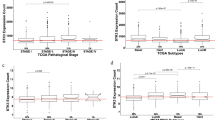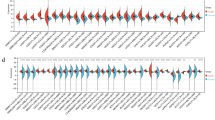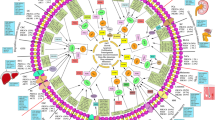Abstract
Downregulation of CKLF-like MARVEL transmembrane domain-containing member 3 (CMTM3) has been reported in a number of human tumors. However, the role of CMTM3 in oral squamous cell carcinoma (OSCC) remains largely unknown. In this study, we showed that the expression of CMTM3 was significantly reduced in OSCC cell lines and primary tumor specimens (P < 0.001). Methylation-specific PCR showed hypermethylation in CMTM3 promoter in a significant proportion of tumor tissues (61 %). The expression of CMTM3 was associated with T stage, lymph node metastasis, tumor node metastasis (TNM) stage, and recurrence of OSCC patients (P < 0.05, n = 201). More importantly, CMTM3 expression was associated with the prognosis of OSCC patients (P < 0.001) and was an independent prognostic factor (hazard ratio = 0.593, 95 % confidence interval, 0.272–1.292; P = 0.039). Overexpression of CMTM3 inhibited the growth and migration of OSCC cells. In vivo experiments also showed that the growth of OSCC xenografts in nude mice was significantly inhibited by CMTM3 overexpression. These findings indicate that downregulation of CMTM3 due to promoter hypermethylation contributed to the proliferation and migration of OSCC cells and suggest that CMTM3 is an independent prognostic factor for the evaluation of the survival of OSCC patients.




Similar content being viewed by others
References
Jemal A, Bray F, Center MM, et al. Global cancer statistics. CA Cancer J Clin. 2011;61(2):69–90.
Tang WY, Ho SM. Epigenetic reprogramming and imprinting in origins of disease. Rev Endocr Metab Disord. 2007;8:173–82.
Feinberg AP. Cancer epigenetics takes center stage. Proc Natl Acad Sci U S A. 2001;98(2):392–4.
Portela A, Esteller M. Epigenetic modifications and human disease. Nat Biotechnol. 2010;28(10):1057–68.
Guerrero-Preston R, Michailidi C, Marchionni L, et al. Key tumor suppressor genes inactivated by “greater promoter” methylation and somatic mutations in head and neck cancer. Epigenetics. 2014;9(7):1031–46.
Arantes LM, de Carvalho AC, Melendez ME, et al. Methylation as a biomarker for head and neck cancer. Oral Oncol. 2014;50(6):587–92.
Khor GH, Froemming GR, Zain RB, et al. DNA methylation profiling revealed promoter hypermethylation-induced silencing of p16, DDAH2 and DUSP1 in primary oral squamous cell carcinoma. Int J Med Sci. 2013;10(12):1727–39.
Towle R, Truong D, Hogg K, et al. Global analysis of DNA methylation changes during progression of oral cancer. Oral Oncol. 2013;49(11):1033–42.
Mascolo M, Siano M, Ilardi G, et al. Epigenetic disregulation in oral cancer. Int J Mol Sci. 2012;13(2):2331–53.
Khor GH, Froemming GR, Zain RB, et al. Screening of differential promoter hypermethylated genes in primary oral squamous cell carcinoma. Asian Pac J Cancer Prev. 2014;15(20):8957–61.
Al-Kaabi A, van Bockel LW, Pothen AJ, et al. p16INK4A and p14ARF gene promoter hypermethylation as prognostic biomarker in oral and oropharyngeal squamous cell carcinoma: a review. Dis Markers. 2014;2014:260549.
Zhang S, Feng XL, Shi L, et al. Genome-wide analysis of DNA methylation in tongue squamous cell carcinoma. Oncol Rep. 2013;29(5):1819–26.
Zhang W, Mendoza MC, Pei X, et al. Down-regulation of CMTM8 induces epithelial-to-mesenchymal transition-like changes via c-MET/extracellular signal-regulated kinase (ERK) signaling. J Biol Chem. 2012;287(15):11850–8.
Han W, Ding P, Xu M, et al. Identification of eight genes encoding chemokine-like factor superfamily members 1–8 (CKLFSF1–8) by in silico cloning and experimental validation. Genomics. 2003;81(6):609–17.
Imamura Y, Katahira T, Kitamura D. Identification and characterization of a novel BASH N terminus-associated protein, BNAS2. J Biol Chem. 2004;279(25):26425–32.
Wang Y, Li T, Qiu X, et al. CMTM3 can affect the transcription activity of androgen receptor and inhibit the expression level of PSA in LNCaP cells. Biochem Biophys Res Commun. 2008;371(1):54–8.
Wang Y, Li J, Cui Y, et al. CMTM3, located at the critical tumor suppressor locus 16q22.1, is silenced by CpG methylation in carcinomas and inhibits tumor cell growth through inducing apoptosis. Cancer Res. 2009;69(12):5194–201.
Xie J, Yuan Y, Liu Z, et al. CMTM3 is frequently reduced in clear cell renal cell carcinoma and exhibits tumor suppressor activities. Clin Transl Oncol. 2014;16(4):402–9.
Li Z, Xie J, Wu J, et al. CMTM3 inhibits human testicular cancer cell growth through inducing cell-cycle arrest and apoptosis. PLoS One. 2014;9(2), e88965.
Su Y, Lin Y, Zhang L, et al. CMTM3 inhibits cell migration and invasion and correlates with favorable prognosis in gastric cancer. Cancer Sci. 2013;105(1):26–34.
Cakir M, Grossman AB. Targeting MAPK (Ras/ERK) and PI3K/Akt pathways in pituitary tumorigenesis. Expert Opin Ther Targets. 2009;13(9):1121–34.
Dworakowska D, Wlodek E, Leontiou CA, et al. Activation of RAF/MEK/ERK and PI3K/Akt/mTOR pathways in pituitary adenomas and their effects on downstream effectors. Endocr Relat Cancer. 2009;16(4):1329–38.
Rakha EA, Pinder SE, Paish CE, et al. Expression of the transcription factor CTCF in invasive breast cancer: a candidate gene located at 16q22.1. Br J Cancer. 2004;91(8):1591–6.
Sun M, Ma L, Xu L, et al. A human novel gene DERPC on 16q22.1 inhibits prostate tumor cell growth and its expression is decreased in prostate and renal tumors. Mol Med. 2002;8(10):655–63.
Fu L, Dong SS, Xie YW, et al. Down-regulation of tyrosine aminotransferase at a frequently deleted region 16q22 contributes to the pathogenesis of hepatocellular carcinoma. Hepatology. 2010;51(5):1624–34.
Dawson AJ, Bal S, McTavish B, et al. Inversion and deletion of 16q22 defined by array CGH, FISH, and RT-PCR in a patient with AML. Cancer Genet. 2011;204(6):344–7.
Towle R, Garnis C. Methylation-mediated molecular dysregulation in clinical oral malignancy. J Oncol. 2012;2012:170172.
Shah NG, Trivedi TI, Tankshali RA, et al. Prognostic significance of molecular markers in oral squamous cell carcinoma: a multivariate analysis. Head Neck. 2009;31(12):1544–56.
Brockmeyer P, Jung K, Perske C, et al. Membrane connexin 43 acts as an independent prognostic marker in oral squamous cell carcinoma. Int J Oncol. 2014;45(1):273–81.
Cheng AN, Jiang SS, Fan CC, et al. Increased Cdc7 expression is a marker of oral squamous cell carcinoma and overexpression of Cdc7 contributes to the resistance to DNA-damaging agents. Cancer Lett. 2014;337(2):218–25.
Li H, Li J, Su Y, et al. A novel 3p22.3 gene CMTM7 represses oncogenic EGFR signaling and inhibits cancer cell growth. Oncogene. 2013;33(24):3109–18.
Acknowledgments
This work was supported by the National Natural Science Foundation of China (grant numbers 81300894, 81030018, 30901680).
Conflicts of interest
None
Author information
Authors and Affiliations
Corresponding author
Rights and permissions
About this article
Cite this article
Zhang, H., Zhang, J., Nan, X. et al. CMTM3 inhibits cell growth and migration and predicts favorable survival in oral squamous cell carcinoma. Tumor Biol. 36, 7849–7858 (2015). https://doi.org/10.1007/s13277-015-3504-1
Received:
Accepted:
Published:
Issue Date:
DOI: https://doi.org/10.1007/s13277-015-3504-1




